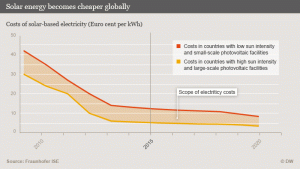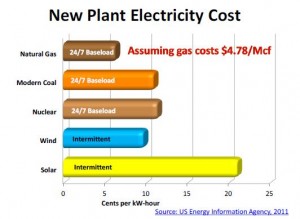Unless you’ve been living under a rock these past few months, you should know that oil prices have dropped dramatically from $115/barrel in June 2014 to merely $49/barrel at the time of this post. As we celebrate how cheap it is to fuel up nowadays (I thought I’d never see gas less than $1/L ever again in my lifetime), I thought it’d be appropriate to bring to your attention another energy source who’s costs have dropped dramatically in recent years – solar generated electricity.
Within the broad spectrum of sustainability, the continued effort to make the world’s energy “greener” has always interested me. So when I came across an article claiming that solar power was the key driver in increasing world-wide renewable energy investments by 16% last year, I was intrigued. If $149.6 billion dollars were invested into solar alone in 2014, which accounted for nearly half of total renewable energy investment, there had to be a reason!
As it turns out, the reason for the boom in solar investment is due to potential returns that solar can earn in the near future. With the rapid advancement in solar technology in recent years, the cost per kilowatt-hour (kWh) of electricity has fallen dramatically – almost reaching parity with traditional forms of electricity generation involving fossil fuels!
Below is a graph showing the comparative costs of electricity across different resources in 2011:
Now here’s a graph of the cost for solar power since then, keeping in mind that traditional energy costs have remained constant:

Even with an exchange rate of $1.16 USD/ $1 Euro, solar energy has become as cheap as traditional energy sources in countries with high sun intensity.
This decrease in price is not just in Europe either! India has also jumped on the solar bandwagon, and their reported cost is a mere $0.105/kWh.
With solar costs dropping so rapidly, investors are hoping that solar energy will soon be able to compete with traditional electricity providers for consumer dollars. In fact, this is already happening in California, with solar accounting for 6% of electricity production in 2013. I guess that’s why they’re called the ‘Sunshine State’!
And how will the recent drop in oil prices affect renewable energy (solar in particular) investment? According to Forbes, we have nothing to worry about. As we can also tell from the first graph above, oil is not used to generate electricity in most parts of the world. At this rate of improvement, perhaps in the future when we’ll all be driving our Tesla vehicles around and celebrating cheap electricity prices instead of cheap gasoline prices!


Good start to your sustainability blogging, Vincent. What do you think these trends will mean, if anything, for organizations like BC Hydro? Why do you think we’re not hearing more about solar yet?
Keep up the good work.
Tamar
At first, I thought the answer would be simple: Solar is a waste of time for BC Hydro due to the laughable amount of sunlight we get each year. However, upon further research I found out that Germany (who leads the world in solar power production) actually receives the same amount of sunlight that we do!
Therefore I am hoping that BC Hydro does take the time to look into solar energy as a viable supplement to their current energy offerings. I believe we as a market can accelerate this process too! Currently BC Hydro has a ‘Net Metering’ program that allows residents to generate electricity themselves and contribute to the power grid in order to reduce costs. If we all start contributing, BC Hydro will notice the market potential of renewable energy.
However, many of us have no idea about the improvements in solar power generation nor the options available to us. For instance, I didn’t know about BC Hydro’s Net Metering program until making this comment!
As to why we aren’t hearing more about solar? I believe it’s because our mainstream media outlets never mention it, so the public is simply unaware. It’s understandable though, murder and gossip stories usually generate more views.
http://americablog.com/2013/02/fox-news-solar-only-works-in-germany-because-its-sunny-there.html
http://www.bchydro.com/energy-in-bc/acquiring_power/current_offerings/net_metering.html?WT.mc_id=rd_netmetering
Hi Vincent!
Thanks for the post, I find it very informative. Alternative energy sources have always been an interest of mine, and I believe people should focus more on these resources. The tricky side of the solar energy is the geographical barriers. Not every country receive the same amount of sunlight, and in many countries the costs simply outweigh the benefits. Vancouver would probably be a good example for this.
You can argue that Germany receives almost the same amount of sun as Vancouver and is leading the world in solar energy generation, but don’t forget that German government heavily subsidized the renewable energy industry to achieve that.
I’m also wondering if wind turbines would be a better alternative for Canada, what is your take on that?
Thanks
Burak